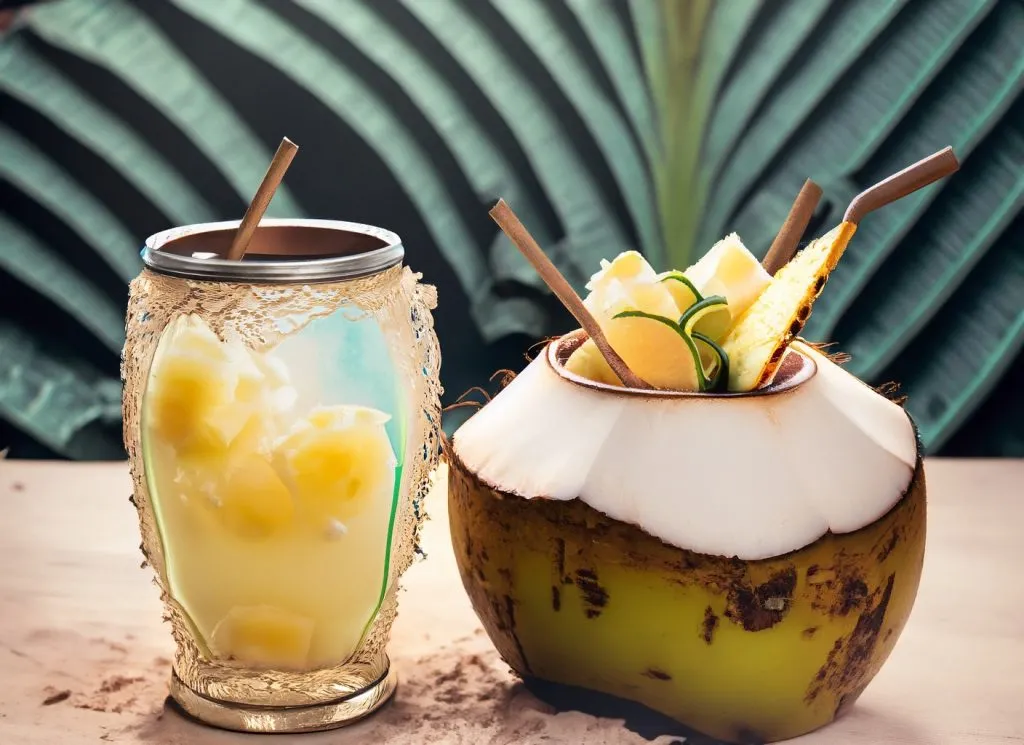Cracking open a coconut and enjoying its sweet, refreshing water is a delightful experience. But have you ever stopped to think about why there’s water inside in the first place? In this blog post, we’ll unravel the mystery behind coconut water and explore its purpose for the coconut.
What is Coconut Water?
Coconut water isn’t simply water as we know it. While it might look clear and refreshing, it’s far more complex. Coconut water is actually the liquid endosperm of a young, green coconut. Endosperm is a special, nutrient-rich tissue that forms inside seeds specifically to nourish and support a developing plant embryo. It’s packed with vitamins, minerals, and electrolytes that help the coconut seed grow into a strong palm tree.
How Does Coconut Water Form?
The journey of coconut water begins deep within the earth:
Absorption: The vast root system of the coconut palm acts like a giant straw, drawing in water and essential nutrients from the surrounding soil.
Upward Journey: This nutrient-rich water is then transported upwards through the tree’s trunk, like sap traveling through veins.
Arrival at the Coconut: Some of this absorbed water reaches the developing young coconuts, nestled high among the palm fronds.
Filtering and Storage: The coconut acts as a natural filtration system. It holds the water within its inner cavity, ready for the next stage of transformation.
The Birth of Coconut Water: Inside the young coconut, a fascinating process occurs. Specialized cells begin converting a portion of the absorbed water into liquid endosperm.
Nature’s Nutritious Drink: This liquid endosperm is what we know as coconut water. It’s packed with electrolytes, vitamins, and minerals – a perfect drink designed by nature to nourish the coconut embryo within.
The Purpose of Coconut Water
Coconut water is far more than a refreshing drink; it’s a lifeline for the developing coconut. Here’s why it’s so important:
Nature’s Power Drink: Coconut water serves as a nutrient-rich fuel source for the young coconut embryo. It contains a balance of electrolytes, vitamins, minerals, and even plant hormones that promote healthy growth and development.
A Protective Shield: The substantial layer of coconut water surrounds the delicate embryo, acting as a shock absorber. It cushions the embryo from bumps and jostles, helping protect it from damage during its early stages. Additionally, it helps regulate temperature within the coconut, shielding the embryo from extreme heat or cold.
A Ticket to Travel: Coconuts are designed for long-distance dispersal. When a mature coconut falls from the tree and rolls into the ocean, the water inside plays a crucial role. It provides sustenance for the encased seed, keeping it viable during potentially long ocean journeys. This allows coconuts to colonize new islands and spread the coconut palm species far and wide.
More Than Meets the Eye: As the coconut matures, the coconut water gradually solidifies into the white coconut meat we’re familiar with. While less water remains in a mature coconut, it still plays a role in providing nourishment and protection to the seed.
Coconut Water vs. Coconut Milk
While both come from the same source, coconut water and coconut milk are distinctly different products. It’s important to understand their differences for culinary uses and to appreciate the unique nature of each.
Coconut Water:
- Found naturally inside young, green coconuts.
- A clear, slightly sweet liquid.
- Lower in fat and calories compared to coconut milk.
- Excellent source of hydration and electrolytes.
- Best enjoyed fresh or from minimally processed sources.
Coconut Milk:
- Made by blending the grated flesh of a mature coconut with water.
- Thick, creamy, and opaque in appearance.
- Richer in flavor and significantly higher in fat content.
- A staple ingredient in many cuisines, adding creaminess to curries, soups, and desserts.
Conclusion
The next time you encounter coconut products, take a moment to appreciate the journey they took. Coconut water, found within the young fruit, is nature’s sports drink, designed to nourish new life. Coconut milk, made from the mature coconut, offers rich flavor and culinary versatility. Both showcase the wonders of the coconut palm!

